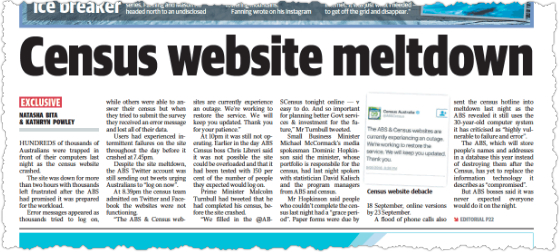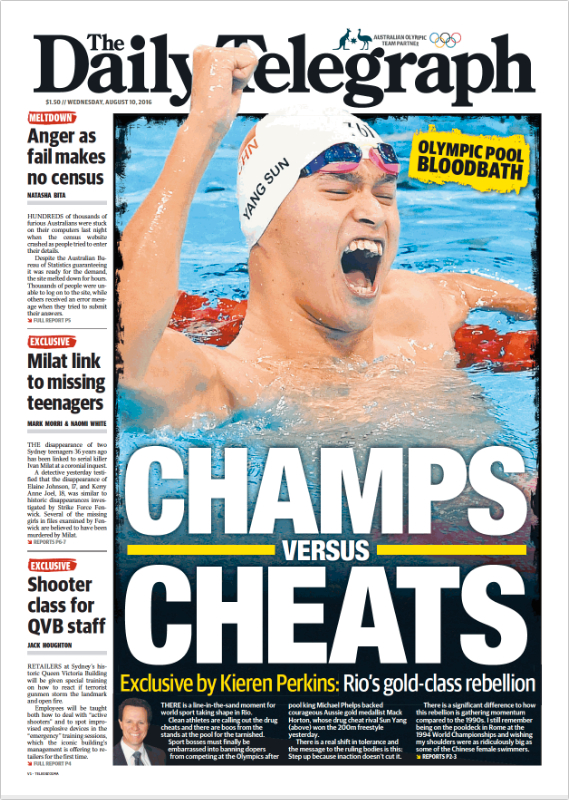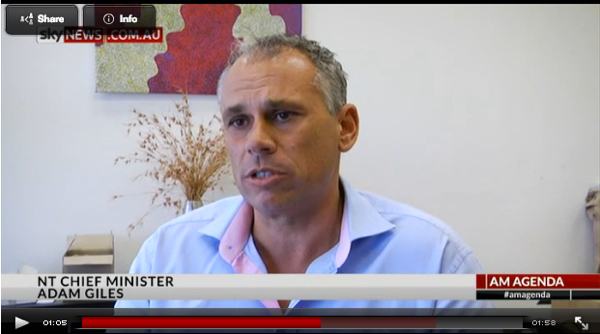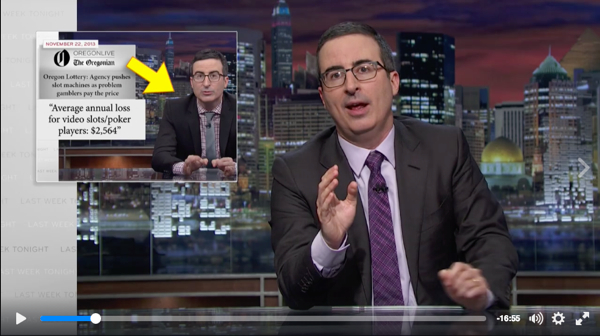Exclusive watch: Tele edition. Heard about the debacle over the Australian census? What took place before the eyes of anyone with a social media account on Tuesday night became an exclusive in yesterday’s Daily Telegraph.

That’s from page 5. On the front page, every single story was an exclusive except the census teaser. But the Tele topped the census yarn with a red splotch similar to that used on the other, actually exclusive stories. Maybe this caused some confusion …

It hardly needs saying, but the story was in other papers. Even The Sydney Morning Herald got a detailed story about the problems in the paper, and their print deadlines are notoriously early. — Myriam Robin
Who reads the Tele anyway? Labor has a new communications spokeswoman in Michelle Rowland. In one of her first interviews, with The Guardian’s Katharine Murphy, she was asked whether The Daily Telegraph is influential in her north-western Sydney electorate. She said it certainly set the talking points:
“If the story of the day [in the Daily Telegraph] was about boats, or about debt — because I would be out door knocking, and calling people every day of the campaign, I would always notice that would be one of the dominant themes coming out.
“At the same time, I don’t know if they were swinging voters, I don’t know if they were reading News because it was reinforcing their view.”
Labor picked up picked up several seats at the Coalition’s expense in New South Wales this election, including the western Sydney seat of Macarthur. — Myriam Robin
Greste’s secret project. Former Al Jazeera correspondent Peter Greste, who spent 400 days in an Egyptian prison on trumped-up charges before being released this year, joined the Four Corners team on Monday. It’s not a permanent arrangement — executive producer Sally Neighbour says he is just doing the one story. “We’re delighted to have him,” she told Crikey.
We tried to tease out what he could be working on, but it appears that’s being kept under wraps for now. — Myriam Robin
No image, no interest. How do you cover a massive news story about refugees with no pictures or footage of the harsh conditions it describes? If you’re a commercial news station, you probably don’t.
Of the free-to-air commercial programs, only The Project last night gave The Guardian‘s Nauru files leak a good run. The scoop didn’t make Ten’s news bulletin, nor Seven’s, nor Nine’s. A Current Affair did not cover the issue.
It is tricky covering a story like that on television, but the public broadcasters gave it a go. SBS World News had a segment on it. On News 24, Lateline covered the revelations by interviewing shadow immigration minister Shayne Neumann. On the main channel, the 5pm ABC News had a short, straight report on the political fallout. It was also a discussion topic on The Drum, which had Guardian journo Paul Farrell on as a guest to talk about the scoop.
The power of images to drive interest in worthy stories got a good consideration after Four Corners’ recent story into juvenile incarceration, which got victims talking on camera and, perhaps most startlingly, video footage of much of the abuse it described. In the wake of it, the family of Ms Dhu, an Aboriginal woman who died in police custody, renewed their campaign to make the video of her treatment in the hours before her death, public. For the refugees on Nauru, it’s not clear whether similar videos even exist. — Myriam Robin
‘Outrageous and desperate’ Giles. NT chief minister Adam Giles has joined Cory Bernardi in saying questions need to be asked about the timing of the Four Corners’ juvenile detention episode.
In comments to Sky News, Giles said:
“Certainly Four Corners have tried to give Labor a leg up, and it’s unfortunate for a public broadcaster to do that, especially one that’s taxpayer funded.”
Four Corners’ executive producer Sally Neighbour says on Twitter the claim is “false, outrageous and desperate”. — Myriam Robin
Newspaper association v John Oliver.
The Newspaper Association of America did not appreciate John Oliver’s take on the importance of newspapers (which we made our video of the day a few days back). A statement by CEO David Chavern, says:
“Other than encouraging people to ‘pay for’ more news, he doesn’t offer any answers. More particularly, he spends most of the piece making fun of publishers who are just trying to figure it out. Whatever you think of the name ‘tronc’ and that company’s announced growth strategy, at least they are trying new things and trying to figure out how to create great news journalism in the digital era. John Oliver doesn’t seem to have any better ideas.
“The fact is that we are in a transitional phase within the entire industry. People want, need and consume more hard news than they ever have. The core demand for the product isn’t decreasing at all, and based upon that we will find our way to the far shore where the industry is thriving and growing once again. But in the meantime, there is going to be a lot of experimentation and evaluation of new business models.
“Some experiments will work and some won’t, and our VP of Innovation, Michael MaLoon is committed to keeping you up-to-date on what is happening on that front. But making fun of experiments and pining away for days when classified ads and near-monopolistic positions in local ad markets funded journalism is pointless and ultimately harmful.
“I would just ask Mr. Oliver to spend more time talking about what the future of news could be, and less time poking fun at publishers who are trying to get there.”
Pig disgruntled. Good news, Piers Akerman: Peppa Pig is an avowed capitalist. In fact, she’s worth at least $1.7 billion, give or take a few hundred million.
It was Akerman who once complained Peppa was some sort of flag-bearer for women’s lib. “Even the cartoon character Peppa Pig pushes a weird feminist line that would be closer to the hearts of Labor’s Handbag Hit Squad than the preschool audience it is aimed at,” he wrote in December 2013, another tiresome attack on the ABC supported by Miranda Devine, Andrew Bolt and others (who all ignored the fact Peppa is also broadcast on Foxtel, half-owned by the columnists’ News Corp employer).
Peppa is now owned by Canadian-based Entertainment One, generating hundreds of millions of dollars a year in revenue from sales of the cartoon series and merchandise. That has made Entertainment One a fat target for others in the TV industry, none keener than ITV, the British commercial TV network and production house which has tossed up a $1.69 billion offer.
But the Pig said “nope”, via a po-faced board statement:
“The Board of eOne has reviewed the Proposal and has unanimously rejected it on the basis that it fundamentally undervalues the Company and its prospects.”
Entertainment One is headquartered in Toronto but listed in London. Last year it paid 140 million pounds to raise its stake to 70% of Astley Baker Davies, the company that makes Peppa Pig. It also bought 51% of the Mark Gordon Company, the Los Angeles-based production group behind the medical drama Grey’s Anatomy. Entertainment One owns and distributes some 40,000 television and film titles, including recent release The BFG in partnership with Amblin Partners.
United Kingdom market analysts say more dosh will be needed to win the pig’s approval. It seems Peppa is far more capitalist than feminist when it comes to takeovers. — Glenn Dyer









Just what the meeja needs, a Peppa Pig led recovery. Sheeeeeeesh
Good on Giles and Bernardi for having the “courage” to convert the airing of a malicious act against children, into the airing itself being the malicious act….
That’s Dealing with Whistleblowers 101, aka shoot the messenger.
Twas ever thus.